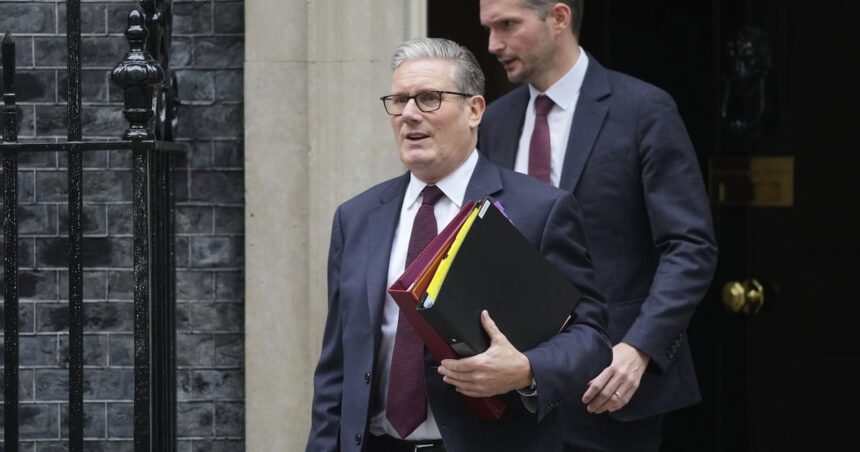In the heart of our capital yesterday, new diplomatic ties were forged as British Prime Minister Keir Starmer made his first official visit to Ottawa since taking office. The visit comes just days before he joins other world leaders at the G7 Summit in Alberta.
The British leader arrived at Ottawa International Airport aboard a Royal Air Force jet around 10 a.m., greeted by a small delegation led by Foreign Affairs Minister Mélanie Joly. The warm June morning provided a pleasant backdrop for what officials described as an important diplomatic mission.
“This visit reinforces the special relationship between Canada and the United Kingdom,” Joly told reporters at the airport. “Our nations share deep historical ties and common values that continue to guide our cooperation on the global stage.”
Starmer’s visit began with a wreath-laying ceremony at the National War Memorial, where he paid respects to Canadian soldiers who fought alongside British forces in both World Wars. The solemn moment reflected the deep military bonds between our nations.
Following the ceremony, Prime Minister Justin Trudeau welcomed Starmer on Parliament Hill with a traditional military honor guard. The two leaders then moved to the Prime Minister’s Office for private discussions lasting nearly two hours.
According to sources within the Prime Minister’s Office, the talks focused on several key areas including climate change initiatives, economic cooperation, and international security concerns. The Ukraine conflict reportedly dominated significant portions of their conversation.
“Canada and Britain stand shoulder to shoulder in support of Ukraine,” Trudeau said during a brief press conference following their meeting. “We’re committed to maintaining pressure on Russia and providing Ukraine with the assistance it needs.”
Starmer echoed these sentiments, adding that his government plans to announce new aid packages for Ukraine in the coming weeks. “Our support for Ukraine isn’t just about defending one nation’s sovereignty,” the British leader stated. “It’s about protecting the international order that keeps all our citizens safe.”
Both leaders also discussed expanded trade opportunities in the post-Brexit era. With Britain looking to strengthen economic ties beyond Europe, Canada represents an important partner with similar regulatory frameworks and business practices.
Local business leaders attended a luncheon with the two prime ministers at the Fairmont Château Laurier. Ottawa Board of Trade President Sueling Ching noted the significance of the meeting for local businesses.
“Having direct conversations about trade opportunities with Britain opens doors for Ottawa’s technology sector and service industries,” Ching said. “Our members are particularly interested in new partnerships in renewable energy and artificial intelligence.”
Later in the afternoon, Starmer addressed students and faculty at Carleton University, where he emphasized the importance of youth engagement in solving global challenges. The university’s International Affairs program hosted the event, which included a question-and-answer session with students.
“The problems we face today – climate change, inequality, threats to democracy – will require your generation’s innovative thinking,” Starmer told the assembled students. “The partnership between our countries provides opportunities for young people to collaborate on finding solutions.”
Dr. Fen Hampson, Chancellor’s Professor at Carleton’s Norman Paterson School of International Affairs, called the visit “a meaningful opportunity for students to engage directly with global leadership.”
Throughout the day, security remained tight but unobtrusive in the capital. Ottawa Police worked with RCMP and British security services to ensure the visit proceeded smoothly. Downtown commuters faced only minor delays as the diplomatic motorcade moved between locations.
I’ve covered dozens of diplomatic visits over my years reporting in Ottawa, but there was something particularly refreshing about Starmer’s approach. Unlike the pomp that often accompanies such visits, the British PM seemed genuinely interested in substantive policy discussions.
The visit concluded with a dinner at Rideau Hall hosted by Governor General Mary Simon. Attendees included cabinet ministers, diplomatic corps members, and representatives from various Canadian cultural institutions.
This morning, Starmer departed Ottawa for Alberta, where he’ll join leaders from the United States, France, Germany, Italy, Japan, and the European Union for the G7 Summit beginning tomorrow. The summit agenda is expected to address global economic challenges, climate initiatives, and the ongoing conflicts in Ukraine and the Middle East.
The short but substantial Ottawa visit underscores Britain’s continued interest in strengthening ties with traditional allies as it redefines its international relationships post-Brexit. For Ottawa, it represents another opportunity to demonstrate our capital’s importance on the global diplomatic stage.
As the G7 preparations continue in Alberta, the discussions that began here in Ottawa will likely influence the broader international conversations in the days ahead.







